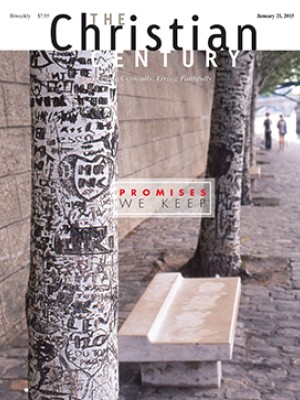A place for Camille: Blessings from a special-needs child

In June 2009, after eight months of routine pregnancy, a sonogram revealed that my wife’s amniotic fluid was low, requiring doctors to perform a C-section and bring our daughter Camille into the world. We were assured that the baby was fine, but then, within 24 hours of her birth, we learned that she had breathing difficulties, was smaller than expected (3 lbs., 10 oz.), and needed to be taken to another hospital.
Thus began a four-week nightmare of traveling 45 minutes each way from our home in Waco to the neonatal intensive care unit at Scott and White Hospital in Temple, Texas. We soon discovered the horror of the NICU for parents. Physicians who work in the NICU do not see “normal” children and don’t assume “normalcy.” They assume problems and are on a constant search to discover them. While this pursuit is medically responsible (there is a reason that a child is in the NICU, after all), my wife and I found ourselves inwardly and sometimes outwardly pleading, “Please, can’t she just be who she is? Must we assume the worst?”
Read our latest issue or browse back issues.
Each visit brought a new concern from her doctors. We’d hear: “Her head is too small.” “Her fingers are too long.” “Are her ears rotated just a little too much?” “Is one eye lower than the other?” “We need to do an MRI.” “Her kidneys worry us.” Guessing what they might posit next filled us with dread.
We weren’t ready to be parents to a special-needs child—that was a club to which other people belonged. This was early in our journey with Camille, and we needed simply to be her parents—to love her as the beautiful child we saw. Wrestling with special needs and genetic syndromes was not something we could comprehend.
But over the coming months we slowly accepted Camille’s condition. When Camille missed developmental milestones we began to acknowledge that she would not be like other children. We became open to genetic testing, moving from not wanting to hear anything into a compulsion to find answers. One geneticist sanctimoniously called it our “diagnostic odyssey.”
What we discovered is that Camille is a mystery. Her doctors are convinced that she has a genetic syndrome, but all tests came back negative. She seems to be one of only a handful of people in the world with her condition. She is profoundly intellectually disabled and will never talk, walk, or eat on her own.
Parents of special-needs children are confronted with a future that seems both ominous and cut off from them. They also confront painful isolation. For us it began with the stark realization that all the dreams we had for our daughter had vanished. There would be no first step, no ballet or golf, no first date, no graduation, and no walk down the aisle. The birth of a special-needs child is experienced first as tragedy. Parents are at a time of life that’s supposed to be joyous but are instead grieving a future that seems like a nightmare. How can a parent express these feelings to another without appearing cold and heartless? Often parents are cut off from others because parents of typical children can’t understand the challenges and fears these parents experience.
Parents like us know that trips out with the family draw attention. We become accustomed to the stares, but life in a fishbowl is isolating. Even when a family musters the courage to walk proudly through a store with their child, they stand out as boldly defying cultural norms as they bravely ignore stares. Other families are simply there, enjoying the solidarity of the American pastime of shopping.
Special-needs families also find themselves isolated in a privileged status that’s given to them by well-meaning but misguided fellow Christians. Every special-needs parent I’ve spoken with has heard, “I couldn’t do what you’re doing. You are such special people. God chose you because he knew you could handle it.” We’ve heard this more times than we care to remember, and we always bristle at the statement. Special-needs parents don’t want the pedestal. These statements imply that we never have a bad day or moments of bad parenting, frustration, or breaking down in tears.
When someone declares us “special,” he or she is suggesting that there is an alternative—that it would be acceptable to refuse to receive our child. As Christians my wife and I do not believe this. Instead, we believe that we are called to love and care for the children God gives us. There is nothing extraordinary is this. We don’t want to be held up as superparents or heroes for loving our children; we want to be recognized as parents.
As they do for any family at our church who has a newborn, church members coordinated and brought over meals twice a week. For most families the meals might be delivered for a few weeks. We received them for months and finally had to request that they stop. Our congregation wanted to support us, and the most tangible way to do that was to offer food.
I realize now that it wasn’t about the meals. Bringing food was a way for our congregation to celebrate Camille’s birth. As I noted earlier, many parents experience the birth of a special-needs child as tragedy, and celebration rarely is part of the family’s first days together. Yet our church was willing to go through the actions of celebration. They rejoiced for us even as we struggled to make sense of a world that had turned over.
The birth of a special-needs child is initially experienced as tragedy. Parents grieve lost dreams, dread an unimagined future, and are frustrated by a new world that they never imagined. Yet for most families the grief is transformed into an experience of great joy and blessing. Families begin to recognize that they might not have the child they imagined, but the child they have becomes a source of joy and deep love. We missed celebrating Camille’s birth, but we don’t miss any opportunity to celebrate and rejoice in the little girl that she is now.
As important as the meals were, we could have easily slipped back into isolation if that had been the end of our church’s outreach to us. Thankfully, a church family that we only knew in passing drew us out. Rachel Craig called us with an open invitation: we were welcome at their house for dinner every Tuesday night—no strings attached. If we needed to eat and run, that was fine. If we wanted to eat and stay, we were welcome to do so. The boys could play (the Craigs have young boys close to our son’s age).
For the next year and a half we spent almost every Tuesday evening at the Craigs’ house. Two other families were also regulars. At those meals we found much-needed community. Tuesday evenings were a space where Camille wasn’t different. She was loved and embraced by everyone there. When we arrived someone would hold her so we could eat and have adult conversation. With the families that encircled us we could share frustrations and fears as well as joys and hopes. Conversations didn’t have to remain safe and superficial. We breathed deeply and let down the walls that we’d erected to protect ourselves from the perceived judgments and evaluation of our parenting efforts.
Then our church began to work to create space for Camille. We belong to a smaller church that doesn’t have a dedicated special-needs ministry. When Camille was a baby it was natural for her to be with other infants in the nursery. The workers listened carefully as we explained what she could and couldn’t do, as well as the best ways to hold her and engage her. Each Sunday morning they welcomed Camille; they never suggested that she was in any way a burden and were genuinely excited by her presence.
When Camille grew too big for the baby room we were concerned. Other children her age were walking, but since she couldn’t we feared that she wouldn’t fit in with other toddlers. But the volunteers encouraged us to bring her, and although she stayed in her stroller she was included in activities. Despite the fact that she couldn’t use her hands to create it, Camille had her own work to take home just like the other kids. Each week one of her teachers completed the class activity and put Camille’s name on it so that we knew she was an important part of the class.
The pattern has held as she’s graduated to older classes. Camille enjoys her time in Sunday school, and the other children see her as a part of the class. One Sunday I came in and saw a three-year-old talking to the teacher while unconsciously resting her hand on Camille’s leg. It was clear that this little girl regarded Camille as her friend and was showing her affection by simple touch. Even as boundaries are broken for our family in these acts, more boundaries come down for other children and adults as they learn to embrace a special-needs child.
Our church has also recognized our needs during worship. The children’s area is crowded during the worship hour, and my wife and I felt that it was a burden to leave Camille (with her large stroller) there during worship. So we either missed worship or sat with Camille in the narthex, trying to listen to the service through speakers.
To draw us out of our exile, our children’s minister began a group known as Camille’s Companions. Each Sunday a volunteer sits with Camille in the narthex so my wife and I can take our son into the service. Sometimes these companions bring their own children to sit with them.
After services we find a group of teenagers gathered around Camille talking to her and holding her hands. These are children of Camille’s Companions who have come to know Camille and see themselves as her friends. Again, what was done as a means of meeting one of our needs has transformed how the teenagers and adults in our church perceive those with disabilities. By looking for ways to make a place for Camille and offer community to our family, our church is discovering that Camille offers gifts back to the body.
Community is important for our family. We need community to embrace us and draw us out of our lives into the larger church family. My wife and I need it. Our son needs it. Camille needs it.
We’ve also learned that our church needs Camille. Too often well-meaning followers of Christ see those with disabilities, particularly children and adults with intellectual disabilities, as objects of care. Able-bodied Christians determine to care for “the least of these.” Rarely are those with disabilities seen as persons with spiritual gifts who have something to offer and from whom other believers might learn—it’s easier to give to those with disabilities than to receive from them. Yet Camille has shown that she is ready to share her gift of joy. Her companions say that it’s impossible to be sad around her, and some add that their time with her is the best hour of their week.
We’re not the only family with a special-needs child who is hungry for community, but other families may not know what that community might look like. Our churches must become places where they find welcome and an embrace that breaks down their isolation. Our congregations need this too. When we fail to bring families and their children with disabilities into the life of the church, the church misses out on gifts that the whole community needs.






